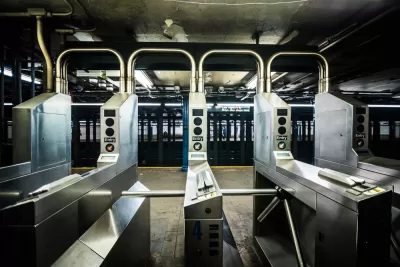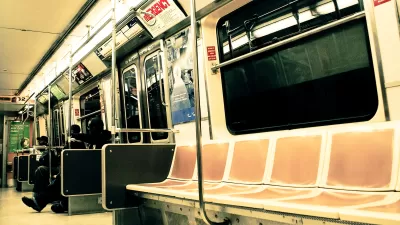The 2019 New York City budget includes $106 million to subsidize half the transit fare for qualified residents for six months. The city joins the ranks of Seattle, Toronto, and the Bay Area that offer income-based discounts for transit fares.

"Mayor Bill de Blasio and Corey Johnson, the City Council speaker, shook hands Monday on a $89.2 billion city budget that included a major concession by the mayor to provide funding for discounted subway and bus fares for some of the poorest New Yorkers," report William Neuman and J. David Goodman for The New York Times on June 11. The current fare for an adult is $2.75 per ride. A monthly MetroCard, enabling unlimited rides, costs $121.
The program will begin in January, with New Yorkers whose income is below the federal poverty line — about $25,000 a year for a family of four [and $12,140 for an individual]. It is estimated that about 800,000 people could be eligible for the subsidy, although far fewer are expected to enroll in the first year.
While the 50 percent discount is high compared to some other means-based, transit discount programs, restricting income to below the federal poverty level eliminates many working poor from eligibility. See programs in Bay Area and Seattle described below for comparison.
The discount is the same as those received by seniors and the disabled. The big difference, though, is that New York City, as opposed to the New York Metropolitan Transportation Authority, will pay the subsidy, which amounts to $106 million for the first six months, "with further financing to come in future budgets," add Neuman and Goodman." The budget also includes "$254 million more for the Metropolitan Transportation Authority, called for by Gov. Andrew M. Cuomo and initially resisted by the mayor."
The program, known as “Fair Fares," was backed by the City Council and surprisingly resisted the progressive mayor.
"I don’t understand how you can justify subsidizing $6.60 for every ferry ride, but not helping people who live in poverty get on the train,” Council Speaker Johnson told the mayor’s budget director at a recent hearing, reported Emma G. Fitzsimmons and J. David Goodman on May 11.
"From its inception, the effort to establish half-priced transit fares for the city’s working poor was conceived by Community Service Society," a New York City non-profit group advocating for low-income residents since 1939, "as an anti-poverty initiative," states the lengthy June 12 press release. The proposal was strongly backed by the Riders Alliance.
Other low-income fare subsidy programs
-
King County Metro Transit in the Seattle area began a program to subsidize transit fare for low-income residents, beginning in 2015. Sound Transit and the Seattle Streetcar also accept the discounted fares, known as ORCA LIFT. The program provides half-price discounts for a much greater percentage of low-income people than Fair Fares, up to double the federal poverty level. A King County individual with an income up to $24,276 qualifies, compared to a New Yorker making half that amount.
Kirk Johnson reported on the program for The New York Times in February 2015. Planetizen's Philip Rojc posted in May 2015 that Seattle joined "Chicago, Cincinnati, Denver, and Kansas City" in offering the low-income discounted fares. Planetizen contributing editor Elana Eden posted on the expansion of the program in December 2016.
-
In April, the Toronto Transit Commission began their Fair Pass program, a "Transit Fare Equity Program for low-income Torontonians" [pdf]. The monthly discount is 21 percent and the single-ride discount is 33 percent.
Finally, an April post by Planetizen managing editor James Brasuell indicates that "four of the [Bay Area's] largest transit agencies and the Metropolitan Transportation Commission [MTC] are proposing a 20 percent discount to low-income riders." Like the King County program, it would be eligible for those earning up to double the federal poverty level.
"The initial idea was to cut fares by 50 percent," reported Michael Cabanatuan for the San Francisco Chronicle on April 10.
While most of the region’s two dozen transit agencies expressed interest, many were afraid that they’d lose too much money. So the [MTC] focused the plan on the six largest transit agencies and reduced the proposed discount to 20 percent.
Julie Teglovic reports "the Commission voted [on May 23] to approve a revised program framework for a Regional Means-Based Fare Program for four large Bay Area transit operators — BART, Caltrain, Golden Gate Transit and SFMTA — during a pilot period."
FULL STORY: New York City’s $89 Billion Budget Includes Discount Transit Fare Plan

Planetizen Federal Action Tracker
A weekly monitor of how Trump’s orders and actions are impacting planners and planning in America.

Map: Where Senate Republicans Want to Sell Your Public Lands
For public land advocates, the Senate Republicans’ proposal to sell millions of acres of public land in the West is “the biggest fight of their careers.”

Restaurant Patios Were a Pandemic Win — Why Were They so Hard to Keep?
Social distancing requirements and changes in travel patterns prompted cities to pilot new uses for street and sidewalk space. Then it got complicated.

Platform Pilsner: Vancouver Transit Agency Releases... a Beer?
TransLink will receive a portion of every sale of the four-pack.

Toronto Weighs Cheaper Transit, Parking Hikes for Major Events
Special event rates would take effect during large festivals, sports games and concerts to ‘discourage driving, manage congestion and free up space for transit.”

Berlin to Consider Car-Free Zone Larger Than Manhattan
The area bound by the 22-mile Ringbahn would still allow 12 uses of a private automobile per year per person, and several other exemptions.
Urban Design for Planners 1: Software Tools
This six-course series explores essential urban design concepts using open source software and equips planners with the tools they need to participate fully in the urban design process.
Planning for Universal Design
Learn the tools for implementing Universal Design in planning regulations.
Heyer Gruel & Associates PA
JM Goldson LLC
Custer County Colorado
City of Camden Redevelopment Agency
City of Astoria
Transportation Research & Education Center (TREC) at Portland State University
Camden Redevelopment Agency
City of Claremont
Municipality of Princeton (NJ)





























